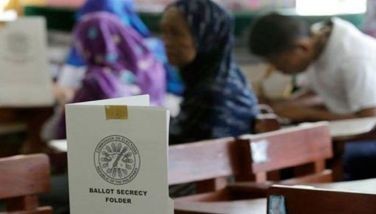SK polls a waste of money - Villar
May 27, 2002 | 12:00am
BAGUIO CITY — Why allot government funds for the youth who don’t seem to care about governance when the money can be given to the elderly who need it?
Senate President Pro Tempore Manuel Villar said yesterday he is in favor of abolishing the Sanggunian Kabataan after the upcoming SK elections set for July 15. Villar cited the low turnout during the recent registration for the SK elections as an indicator that the youth are not interested in governing the country or in learning the skills needed for good governance.
Villar told reporters at a press briefing that the recent special registration for SK members last week cost the government millions of pesos and was assessed as a big waste of government funds. The low SK registration turnout was interpreted by the Commission on Elections (Comelec) as an indicator that the youth are no longer interested in the SK elections.
"Although the special registration was publicized in many national and local newspapers and on television, I do not see any reason why it had a low turnout," Villar said, adding that "there are many avenues where these youth can practice their talent as future leaders, like school and youth organizations."
In Baguio City and Benguet, only 30 percent of the 10,000 SK registration forms were used, city Comelec officer Julius Torres said. In those two areas, P964,800 was earmarked as honoraria for teachers participating in the two-day SK registration, with each teacher receiving P1,200 in honorarium payments.
Once the July 15 SK elections are over, Villar said, it is time for the government to review the role of the SK: "The SK, formerly the Kabataang Barangay, was created under the leadership of the late President Marcos. It is only in the Philippines that there is such a thing. Other countries do not have an SK."
Senior citizens, on the other hand, need improved social services and good work and educational opportunities to make their retirement years more comfortable and productive. With this in mind, Villar filed a bill that will improve the current package of government benefits given to senior citizens.
"We must provide our elderly (with) all the needed means to live dignified lives in their twilight years," Villar said.
The Villar measure aims to provide incentives to private firms that hire senior citizens in the form of tax deductions on their gross profits. Under the bill, 25 percent of the total amount paid in wages to senior citizens will be deducted from the firm’s gross income.
The Villar bill also provides for the earmarking of adequate resources for the continuing formal and non-formal education of senior citizens who wish to engage in further studies. The bill also seeks to make illegal the non-admission of elderly persons by schools and colleges for reasons of age.
Villar, through his measure, also proposed the creation of a national health program for the elderly to provide preventive medical treatment and for diagnosis of diseases and disabilities. Under this proposed health program, the elderly will be given health services such as immunization, nutrition and tests for the early detection of diseases.
"Our senior citizens deserve all the support from government so they can live their lives in comfort and dignity," Villar said.
Senate President Pro Tempore Manuel Villar said yesterday he is in favor of abolishing the Sanggunian Kabataan after the upcoming SK elections set for July 15. Villar cited the low turnout during the recent registration for the SK elections as an indicator that the youth are not interested in governing the country or in learning the skills needed for good governance.
Villar told reporters at a press briefing that the recent special registration for SK members last week cost the government millions of pesos and was assessed as a big waste of government funds. The low SK registration turnout was interpreted by the Commission on Elections (Comelec) as an indicator that the youth are no longer interested in the SK elections.
"Although the special registration was publicized in many national and local newspapers and on television, I do not see any reason why it had a low turnout," Villar said, adding that "there are many avenues where these youth can practice their talent as future leaders, like school and youth organizations."
In Baguio City and Benguet, only 30 percent of the 10,000 SK registration forms were used, city Comelec officer Julius Torres said. In those two areas, P964,800 was earmarked as honoraria for teachers participating in the two-day SK registration, with each teacher receiving P1,200 in honorarium payments.
Once the July 15 SK elections are over, Villar said, it is time for the government to review the role of the SK: "The SK, formerly the Kabataang Barangay, was created under the leadership of the late President Marcos. It is only in the Philippines that there is such a thing. Other countries do not have an SK."
Senior citizens, on the other hand, need improved social services and good work and educational opportunities to make their retirement years more comfortable and productive. With this in mind, Villar filed a bill that will improve the current package of government benefits given to senior citizens.
"We must provide our elderly (with) all the needed means to live dignified lives in their twilight years," Villar said.
The Villar measure aims to provide incentives to private firms that hire senior citizens in the form of tax deductions on their gross profits. Under the bill, 25 percent of the total amount paid in wages to senior citizens will be deducted from the firm’s gross income.
The Villar bill also provides for the earmarking of adequate resources for the continuing formal and non-formal education of senior citizens who wish to engage in further studies. The bill also seeks to make illegal the non-admission of elderly persons by schools and colleges for reasons of age.
Villar, through his measure, also proposed the creation of a national health program for the elderly to provide preventive medical treatment and for diagnosis of diseases and disabilities. Under this proposed health program, the elderly will be given health services such as immunization, nutrition and tests for the early detection of diseases.
"Our senior citizens deserve all the support from government so they can live their lives in comfort and dignity," Villar said.
BrandSpace Articles
<
>
- Latest
- Trending
Trending
Latest
Trending
Latest
Recommended





























